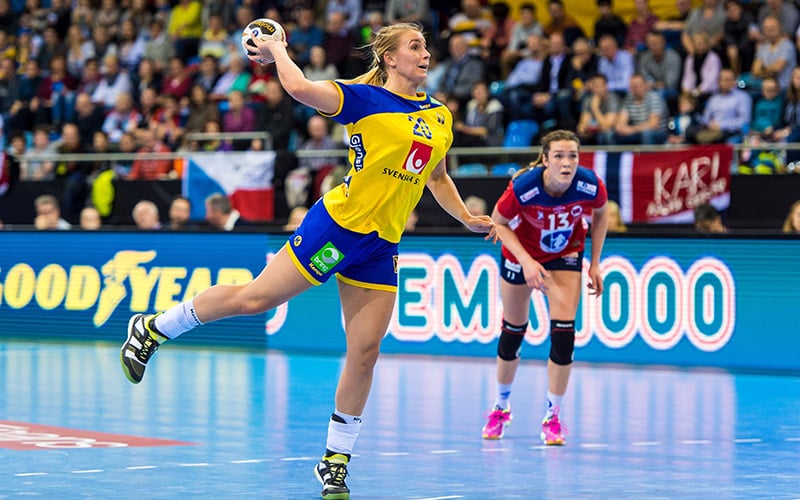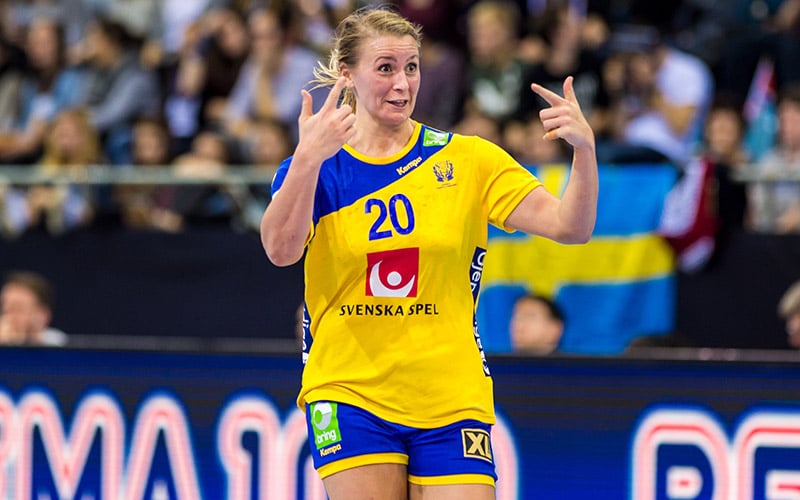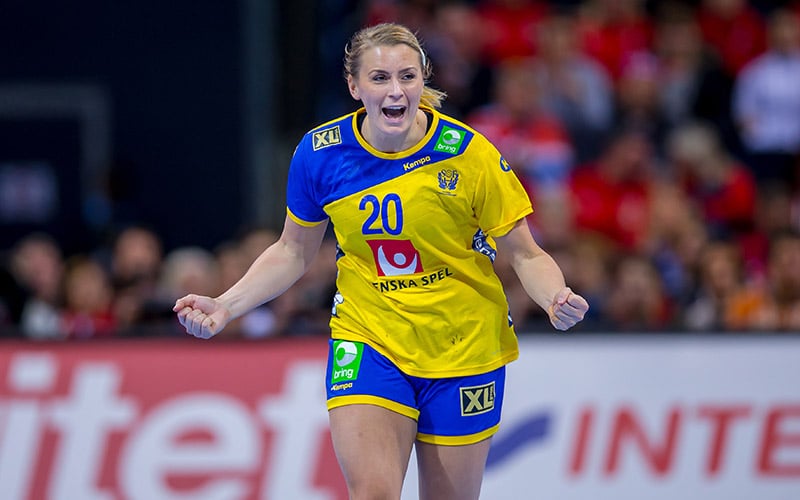Goodbye, player Bella! Welcome, coach Gulldén: "Handball has given me everything"
30 Apr. 2025

Once in a while, a changing of the guard comes in any sport. For handball, 2024 and 2025 have seen a slew of high-profile players retiring, with Mikkel Hansen and Nikola Karabatic saying goodbye to the sport in 2024, while Cristina Neagu, Andrea Lekić, and Jovanka Radičević are set to retire this summer.
But two weeks ago, another star who blazed a trail in women’s handball, Isabelle Gulldén, announced her retirement from her playing career after leaving an indelible mark on the sport.
Gulldén, now 35 years old, has long been considered one of the top centre backs in the world. Her infectious personality and outstanding skills transformed the sport and endeared her to fans worldwide.
“I actually feel good. I think I have been prepared because when I moved back home to Sweden, I signed for three years, so I was, like, pretty sure that after three years I would quit playing. So I have always been a little bit prepared, but, yeah, it's always a little bit sad when you make the decision. But I actually haven’t had so many thoughts about it,” says Gulldén.
After winning her second Champions League trophy with Vipers Kristiansand in 2022, the centre back returned to Sweden, where she played for Lugi HF. Gulldén played her last match in August 2024 and subsequently took time off due to personal reasons.

“For me, I actually played my last game already in August 2024, so I had, like, a lot of months off. But then I was preparing to come back and play at least one more game. But, yeah, I had so many other things to think about because of my sister’s passing. So for me, I haven’t had the time to focus or adapt. It’s just been a bit like surviving,” adds Gulldén.
But how does a player of this calibre—used to winning and having played hundreds, if not thousands, of matches—transition from being an active player to a new routine?
“It does change a lot. Of course, there are new priorities, new schedules. Now, I am a bit of a housewife,” jokes Gulldén, who will start working as an assistant coach for IK Sävehof, the club that propelled her to stardom.
"This club has shaped me—not just as a player, but as a person—and now I get the chance to give back. I look forward to contributing as a coach, not just to the players' development on the court, but also as individuals off the court. Just as the club once nurtured me, I want to help create the same opportunities for the next generation," says Gulldén.
Gulldén was born in Partille, meaning her first steps in handball came at Sävehof, where she rose through the ranks before making her senior debut at only 18 years old, in 2007.

And then, everything changed. As Gulldén was preparing for the 2008 IHF Women’s Junior World Championship, she got a call that would change her career. Still a teenager, she was called up to the Sweden national team for the Beijing 2008 Olympic Games after making her debut in November 2007.
“It is always an honour to represent your country. For me, I was always so proud and happy, and I always screamed during the national anthem. Handball is getting bigger and bigger in Sweden now, and during major competitions, you feel like your whole country is behind you. So, yeah, it’s hard to explain the feeling, but you feel proud, you feel happy, and there's also pressure. It's a mix of everything,” says the centre back.
The Beijing 2008 Olympic Games were Gulldén’s first major international tournament. Still an up-and-coming player with tremendous potential, she would go on to play 224 matches for the national team—the sixth most—and score 846 goals—the fourth most in Sweden’s history.
“It’s crazy to think I was so young. I was really surprised when I got the call because we also had the Junior World Championship. So I was prepared to go there, and then this huge surprise came. I didn’t expect to play. I was just going to enjoy the experience. I remember one of our backs got injured, and we didn’t have many options. At that time, you couldn’t call anyone to replace an injured player. So the replacement was a line player, and suddenly I was on the court. I remember I fell while making a cross—this is how nervous I was. But being 19 and seeing all the stars and having older players take you to watch other games—it was my first major championship and I didn’t know what to expect. But it was really amazing,” she adds.

That Olympic experience—one of three she participated in, alongside London 2012 and Rio 2016—left a lasting impression on the centre back.
“You can basically see every big sports star. I think it’s because it only happens every four years, and it’s so big—so international—that everyone is watching. Even people who don’t follow handball watch it during the Olympics. While the World Championship or European Championship are huge, this is always something special. The atmosphere is incredible—you go into the dining room and see stars from different sports. It's also very hard to qualify. If you ask anyone, they'd probably say that an Olympic medal would be the greatest one. It’s hard to explain why, but I think it’s because it’s so international,” says Gulldén.
After Beijing 2008, Gulldén became a fixture for Sweden, earning MVP honours at the EHF EURO 2014, where the team won bronze—her second continental medal after the 2010 silver. She represented her country in five IHF Women’s World Championships, with the best result being fourth place in Germany in 2017.
At club level, Gulldén was a powerhouse, winning the EHF Champions League twice—first with CSM București in 2016, when the Romanian side beat Győr in the final, with Gulldén scoring 15 goals, and again in 2022 with Vipers Kristiansand.
“The Champions League title with CSM is, of course, the greatest memory. Handball has given me everything. That’s the best memory. And then, of course, the medals with the national team—the bronze and silver at the EURO. The moments you win are always the best, but also meeting people and everything else. But if you talk concretely, it's definitely the win with CSM,” says the Swedish centre back.
That victory cemented her legendary status among CSM fans—just as she was beloved in Sweden and among handball followers around the world. An outpouring of messages followed her retirement announcement, proving she was one of the sport’s greats of the past decade.
“That makes me feel really good. Actually, I’ve been really emotional, reading all the comments and mail I received after the announcement. Of course, you know you’re good at handball, but so many of these messages were personal. They talked about my playing style, my smile, everything. So for me, it really touched my heart, because that’s something I can take with me—many people spoke about who I am as a person,” adds the centre back.
Now, a new chapter begins. Gulldén returns home to Sävehof, where she will serve as an assistant coach. And while the goal of becoming a head coach is still years away, the ambition is clearly there.
“I think it’s very different because you can’t influence things the same way. At least at the start, you still think like a player. Before, I thought I could never be a coach. All the pressure, everything involved, and the fact that you can’t directly influence things on the court. But I love handball—I’ve always loved handball. So if I can give something back, maybe I’ll go for that. I’ll see,” she says.
“I think it will take some time. That’s why it’s nice now to be an assistant, rather than jumping straight into a head coach position. I received some offers to be a head coach, but I think that would be difficult right now. It’s different from being a player—you have to feel the game, call time-outs, make decisions. But over the last few years, I’ve been preparing to go in this direction.”
Gulldén also reflects on how her playing career shaped her perspective on coaching.
“I was also different, and sometimes I was angry that people weren’t like me. But, you know, every player is different. I wanted things my way; someone else wants it their way. You need to make it work. I think that’s the hardest part in coaching—you have to understand everyone. Everyone needs a role. Even if some players don’t get much time on court, I’ll be working with young players, so I really need to develop them,” adds the former centre back.
And what’s one piece of advice Gulldén would give to young players just stepping onto the big stage?
“Take care. I think you go on for so long as a handball player, pressing your body constantly. I never had a knee injury throughout my career, but now that I moved home, my knees are totally broken. I think we push our bodies so hard in every way. Of course, you need to think about this sometimes, but it's hard when you’re playing. You never want to miss a match, and you don’t want to put your team in a tough situation. You always push yourself, even when you’re sick. It takes a lot to step back, concludes Gulldén.
Photo credit GER 2017: Sascha Klahn

